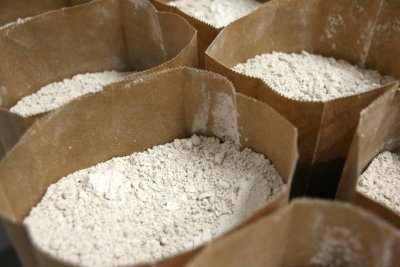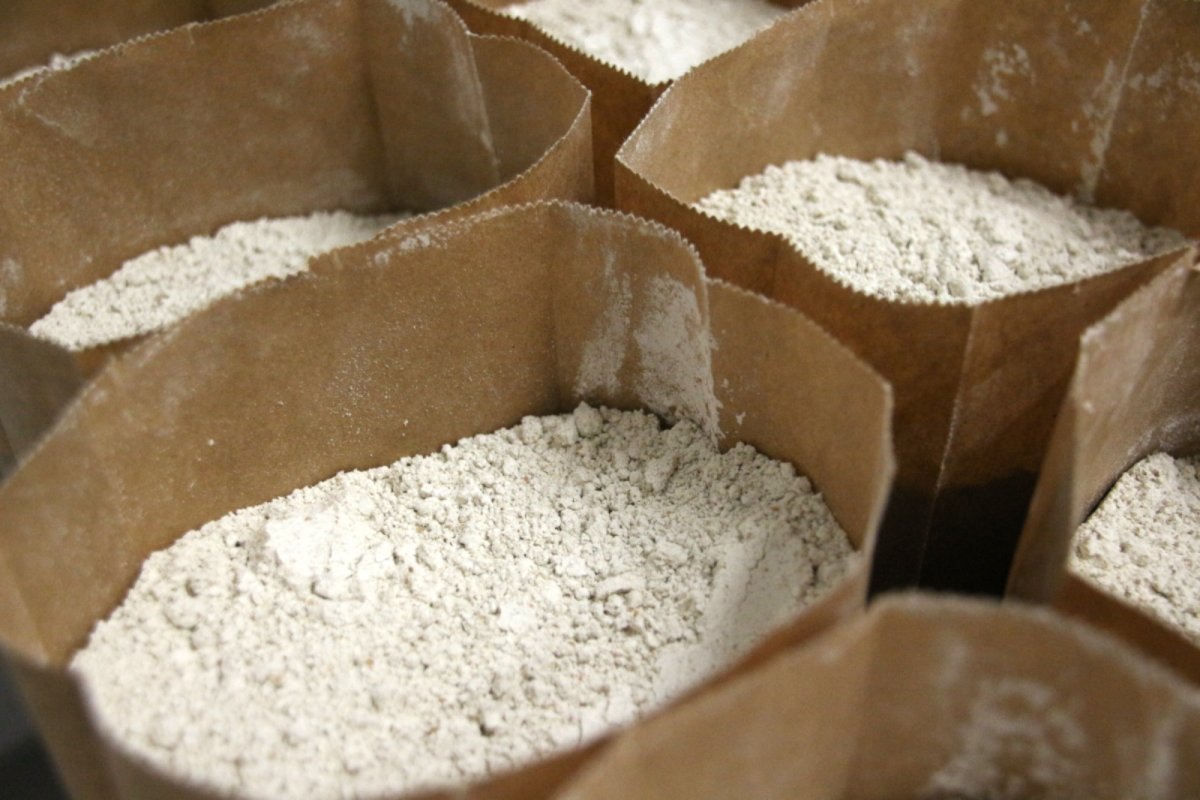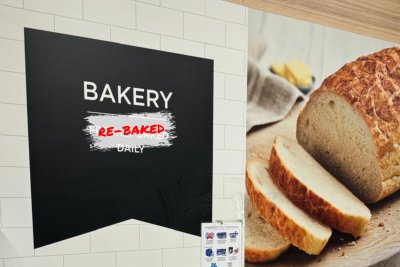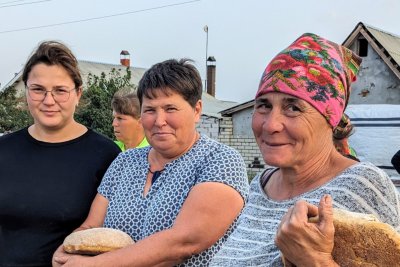 Wholemeal flour definition plus 'fortification' exemptions. Credit: Chris Young / www.realbreadcampaign.org CC-BY-SA-4.0
Wholemeal flour definition plus 'fortification' exemptions. Credit: Chris Young / www.realbreadcampaign.org CC-BY-SA-4.0
On 17 January 2024, Defra and DoHSC published a response to the results of the public consultation on proposed amendments to The Bread and Flour Regulations 1998 and The Bread and Flour (Northern Ireland) Regulations 1998, which ran from 1 September to 23 November 2022.
Wholemeal means wholemeal
While the existing Regulations only permit use of the word wholemeal to name and advertise a product if all of the wheat flour used is wholemeal, there is no legal definition of that word. Though not included in the limited scope of the consultation, the Real Bread Campaign had proposed that one is needed.
The consultation response confirms adoption of this: ‘To maintain consumer protection so that consumers can be assured wholemeal flour is authentic, we will be introducing a legal description that means wholemeal flour must consist of the whole product from the milling and grinding of cleaned cereal.’
Real Bread Campaign coordinator Chris Young said:
‘We’re glad that the government listened to us on this point. We welcome this small step towards clearing up the confusion surrounding use of the words wholemeal and wholegrain.’
Complaints by the Real Bread Campaign about companies using the word wholemeal to name and advertise products made using white flour are currently being investigated by trading standards officers at a number of local authorities.
Exemptions
Two new exemptions from the requirement to add so-called fortificants to non-wholemeal wheat flour, which the Real Bread Campaign supported in its submission to the consultation, are:
- Flour milled from wheat other than Triticum aestivum, such as spelt, emmer, durum, einkorn and khorasan.
- Flour from mills that produce 500 tonnes or less per year.
Chris Young said:
‘We welcome these changes, which at least offer the choice of additive-free food to a few more people, as well as giving a USP to the farmers, millers and bakers who will produce these flours and make Real Bread from it. It’s frustrating that people who enjoy food made using white and brown wheat flour, which is the vast majority of us in the UK, don’t have that choice.’
Mass medication of the nation
Other changes proposed in the consultation that are now due to be enacted in 2024 include:
- Increasing the minimum level of calcium carbonate, iron and niacin in non-wholemeal flour to 15% of the nutrient reference value per 100g of flour.
- Non-wholemeal wheat flour will be required to contain 250 micrograms of folic acid (added in the form of pteroylmonoglutamic acid) per 100 grams of non-wholemeal wheat flour.
The Real Bread Campaign’s position on these issues remains unchanged.
Manufacturers will have 24 months from enactment to comply with the new requirements.
Honest Crust Act
The Real Bread Campaign maintains that this was a missed opportunity to fully review and overhaul outdated regulations related to bread and flour, and continues to lobby for updated and improved composition, labelling and marketing standards.
Please note that this is an initial reaction, based on a first reading of the consultation response.
Updates
1 August 2024: Defra replied to the email we sent on 15 July, asking when the updated regulations and guidance will be published. 'In terms of timings the election has meant the date for adoption as projected in the WTO notification wasn’t possible. We can’t provide specific dates at this time as we need to confirm next steps with new ministers. Once we have more clarity on this, I will look to update you and other interested stakeholders.'
7 March 2024: Defra told us 'We are certainly looking to co-ordinate the publication of updated guidance with the legislative changes coming in.
To clarify the guidance will cover all the provisions covered by the bread and flour regulations including the requirements related to wholemeal.
This work is being conducted on a UK-wide basis with the officials from the Food Compositional Standards and Labelling Framework, it’s hard to give an exact date of publication at this stage as you may have seen from the WTO notification, we expect to lay the legislation at different times across the different administrations due to differing processes and parliamentary schedules. However, we are looking to have a consistent common commencement date across the UK so that the new provisions come into force at the same time across the UK. We will keep you and other members of the Bread and Flour Technical Working Group updated on the development of the guidance as this work progresses.'
26 February 2024: We asked Defra: '
When will Defra publish its guidance on use of the word wholemeal? Will it be in July to coincide with adoption of the amended Bread and Flour Regulations?
Trading standards officers at a number of local authorities have been saying for months that, until they have this official guidance, they are unable (or unwilling) to proceed on cases involving complaints about apparent breaches of Regulation 6.
In the meantime, the Federation of Bakers has sought legal guidance and published an opinion.'
9 February 2024: Defra advised that it had notified the World Trade Organisation of the planned changes to the Bread and Flour Regulations. The proposed dates of adoption of the amended Regulations are: 15 July 2024 (England and Wales), 2 September 2024 (Scotland), TBC September 2024 (Northern Ireland). They would then come into force on 1 October 2026.
24 January 2024: Defra replied: 'We are currently preparing to notify the WTO of the draft legislative changes in the coming weeks. The notification process involves a comment period for WTO members, following this we anticipate laying the amending legislation in the summer.'
18 January 2024: We emailed Defra: 'It is good to see that the government has agreed to adopt our proposal of introducing a legal definition of wholemeal flour. We also welcome the new exemptions from 'fortification' requirements for flour milled from wheats other than T. aestivum, and flour milled by mills producing less than 500 tonnes p/a.
What is the timescale of when this year the new Regulations (including the new wholemeal definition), and accompanying guidance, will be published?
Despite the clarity of Regulation 6, trading standards officers at a number of local authorities are still declining to take action against companies using the word wholemeal to name and advertise products containing non-wholemeal flour until they receive the guidance from Defra.'
Real Bread Campaign: The Real Bread Campaign finds and shares ways to make bread better for us, better for our communities and better for the planet. Whether your interest is local food, community-focussed small enterprises, honest labelling, therapeutic baking, or simply tasty toast, everyone is invited to become a Campaign supporter.
Sustain
The Green House
244-254 Cambridge Heath Road
London E2 9DA
020 3559 6777
sustain@sustainweb.org
Sustain advocates food and agriculture policies and practices that enhance the health and welfare of people and animals, improve the working and living environment, promote equity and enrich society and culture.
© Sustain 2024
Registered charity (no. 1018643)
Data privacy & cookies
Icons by Icons8








